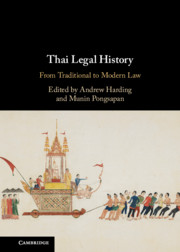Book contents
- Thai Legal History
- Additional material
- Thai Legal History
- Copyright page
- Contents
- Tables
- Contributors
- Preface
- Chronology
- Table of Cases
- Legislation, Constitutional Provisions, and Treaties
- Abbreviations
- 1 Introduction
- 2 Thai Legal History
- Part I Traditional Law and its Modern Resonances
- Part II Foreign Influence and the Reform Period
- 8 British Judges in the Supreme Court of Siam
- 9 The Fundamental Misconception in the Drafting of the Thai Civil and Commercial Code of 1925
- 10 The Modernisation of Thai Criminal Law
- 11 Thai Trust Law
- 12 The History of Thai Family Laws
- 13 The Origins of Thailand’s Bureaucratic State and the Consolidation of Administrative Justice
- 14 Siam and the Standard of Civilisation in the Nineteenth Century
- Part III Constitutional Conflicts 1932–2017
- Glossary
- Index
8 - British Judges in the Supreme Court of Siam
from Part II - Foreign Influence and the Reform Period
Published online by Cambridge University Press: 28 May 2021
- Thai Legal History
- Additional material
- Thai Legal History
- Copyright page
- Contents
- Tables
- Contributors
- Preface
- Chronology
- Table of Cases
- Legislation, Constitutional Provisions, and Treaties
- Abbreviations
- 1 Introduction
- 2 Thai Legal History
- Part I Traditional Law and its Modern Resonances
- Part II Foreign Influence and the Reform Period
- 8 British Judges in the Supreme Court of Siam
- 9 The Fundamental Misconception in the Drafting of the Thai Civil and Commercial Code of 1925
- 10 The Modernisation of Thai Criminal Law
- 11 Thai Trust Law
- 12 The History of Thai Family Laws
- 13 The Origins of Thailand’s Bureaucratic State and the Consolidation of Administrative Justice
- 14 Siam and the Standard of Civilisation in the Nineteenth Century
- Part III Constitutional Conflicts 1932–2017
- Glossary
- Index
Summary
In 1855 Siam signed the Bowring Treaty with Britain, the first of 15 unequal trade treaties with nations around the world. The treaties introduced to Siam extraterritoriality, or consular jurisdiction over foreign subjects in exclusion of Thai authorities’ jurisdiction, using specially established consular or international courts staffed by foreign judges. As well documented and discussed elsewhere, this extraterritoriality led to the pressure for the country to modernise its legal system and introduce legal codes modelled on codes in civil law countries such as France, Germany and Japan. Much less examined is the quiet and latent influence of common law during this important juncture of the country’s legal history. This chapter looks at some of the leading British lawyers in Siam who, following the abolition of the international court, sat in the Supreme Court of Siam, or Dika Court, as members of the ‘Committee of the Supreme Court’, an equivalence of modern day judges. The chapter examines their legal backgrounds, their legal careers in Siam, and their role as Supreme Court judges. As the chapter traces through their work, our inquiry reveals a fascinating dynamic of common law legal reasoning and principles in a civil law, code-based jurisdiction. This investigation into the role of these British judges during the formative years of Siam’s newly established legal system, often understated and unexplored in academic literature, is crucial for a more complete understanding of the country’s process of modernisation.
Keywords
- Type
- Chapter
- Information
- Thai Legal HistoryFrom Traditional to Modern Law, pp. 103 - 121Publisher: Cambridge University PressPrint publication year: 2021

